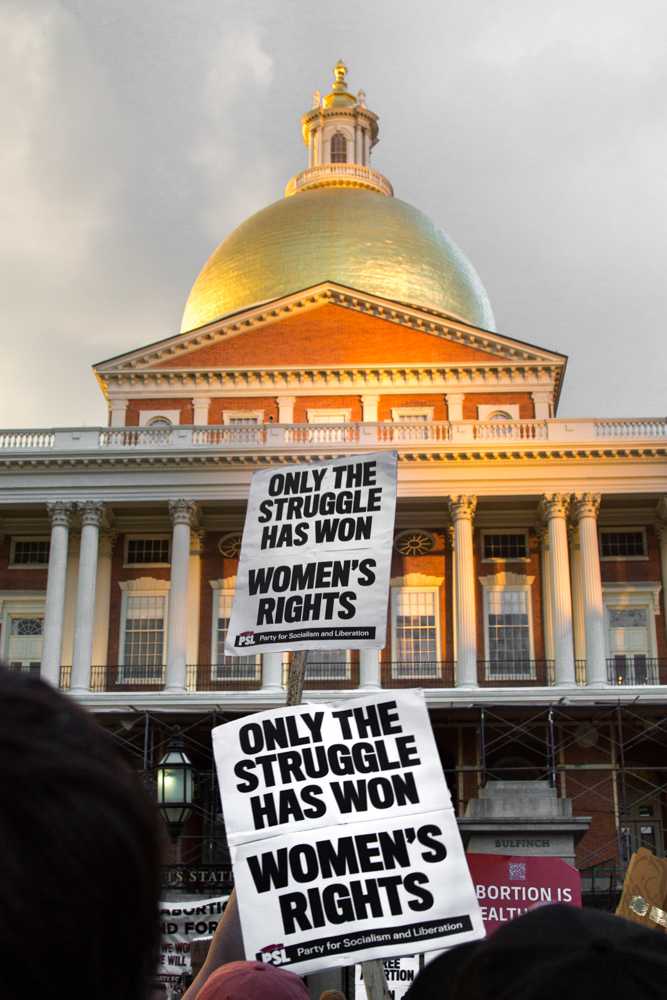
By Stella Tannenbaum and Emma Hagert
State legislation requiring Massachusetts public colleges and universities to provide medication abortion at campus health centers, among other measures to expand and protect abortion access, was signed into law Friday by Gov. Charlie Baker.
Since the Supreme Court’s vote last month to overturn Roe v. Wade — which had guaranteed the right to legal and safe abortions for 50 years — states including Alabama, Arkansas and Missouri have implemented abortion bans.
Jennifer Childs-Roshak, president and CEO of Planned Parenthood League of Massachusetts, wrote in a press release Monday that the law “unequivocally affirms that abortion is health care.”
“Zip code, income, or identity should not be a barrier to care,” Childs-Roshak wrote. “Until these protections are enshrined into law, providers and patients in Massachusetts will live in fear of repercussions from regressive laws passed by other states.”
Patricia Stewart, executive director of Massachusetts Citizens for Life, wrote in a statement to the Daily Free Press that the organization is thankful for the Supreme Court’s decision and plans to work with legislators to pass pro-life laws.
“It is also vitally important to protect women with unplanned pregnancies and their unborn child from the death machine that is the billion dollar abortion industry,” Stewart wrote.
While the law would only mandate medication abortion access in public colleges, Shana Weitzen, a student in Students for Reproductive Freedom, said the group hopes to work with Student Health Services to make this resource available to students at Boston University, a private university.
Following the Supreme Court decision, President Brown wrote a letter to the BU community expressing “profound disappointment,” calling it an “enormous step backward in protecting the rights of all women in our country.” Weitzen said she appreciates the sentiment, but was concerned about Brown’s lack of gender-inclusive language.
Weitzen, a rising sophomore in the Pardee School of Global Studies, said only referring to “women” excludes transgender, intersex and non-binary individuals. She said this language is especially upsetting for a letter sent to the entire community.
“It’s not just a women’s issue,” said Weitzen. “The people who are in the LGBT community that do need abortions, [but] don’t identify as women … it’s harder for them to get the reproductive healthcare they need.”
Alternative phrases that are more inclusive, Weitzen said, are “people with uteruses,” “people with wombs” or “birthing people.” However, Weitzen said she was happy that BU put out a statement.
Planned Parenthood strives to provide “gender-inclusive healthcare,” said a spokesperson for Planned Parenthood League of Massachusetts. The spokesperson, who declined to be named, said they are intentional in using language like “people who get abortions.”
“[We] certainly encourage everyone who’s talking about this issue to use gender inclusive language because this is absolutely healthcare that more people than women can and do seek,” the spokesperson said.
Massachusetts law still protects access to abortion and reproductive healthcare. Planned Parenthood provides abortions, STI testing, emergency contraceptive and birth control, among other services. They also offer a free, anonymous and confidential Sexual Health Counseling and Referral Hotline, which is available to both in-state and out-of-state residents.
BU will continue to provide pregnancy options counseling and health insurance that covers the cost of reproductive healthcare procedures, according to Brown’s email. The university’s Student Health Insurance Basic Plan will cover 80% of the cost of an in-network elective abortion and after a $250 deductible.
Mackenzie Pike, co-president of Students for Reproductive Freedom, said these services are positive offerings, but the process needs to be streamlined and shame-free.
“I think the services are good, but how it’s being offered needs to be worked on,” Pike said.
In March, Students for Reproductive Freedom unveiled an on-campus emergency contraceptive vending machine, which Pike said was partly motivated by students having hard times with getting reproductive healthcare with Student Health Services. The club is also planning to develop fundraisers to support abortion funds.
Pike stressed that Students for Reproductive Freedom is a place not only for activism but also for camaraderie and education about reproductive justice. Weitzen said the club is a supportive, LGBTQ-friendly space.
“It’s really nice to have a place where you can go and kind of vent that anger with people who will fully vent it with you, but also want to do something about it,” Weitzen said.























































































































